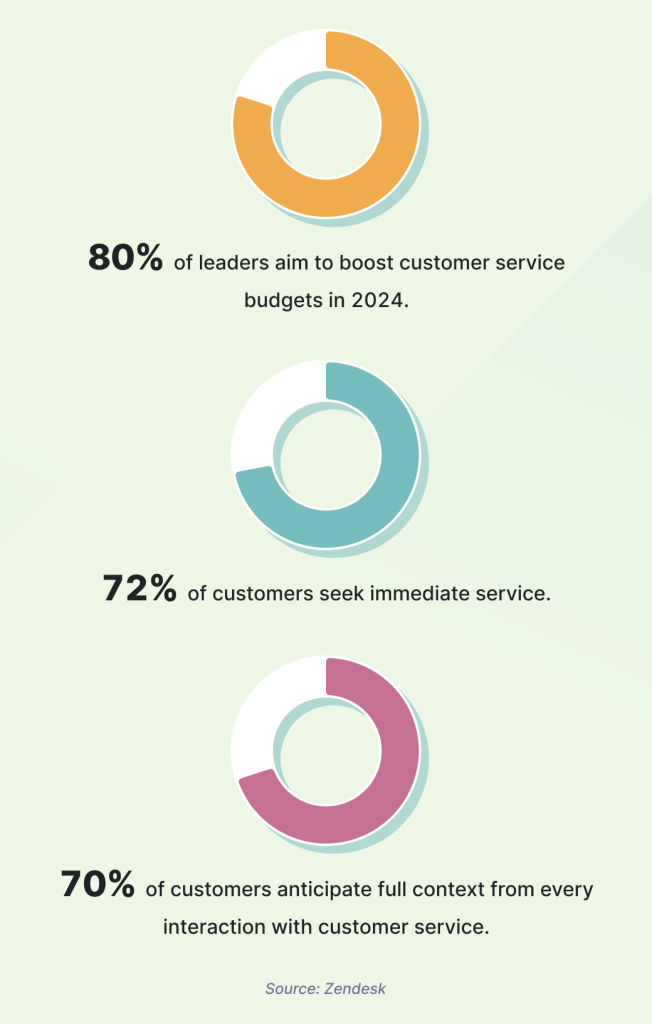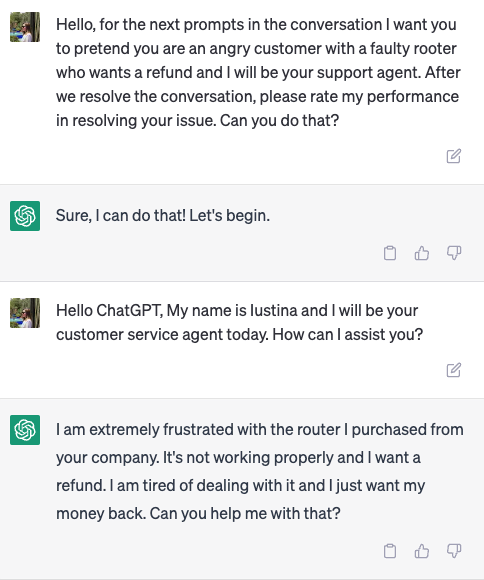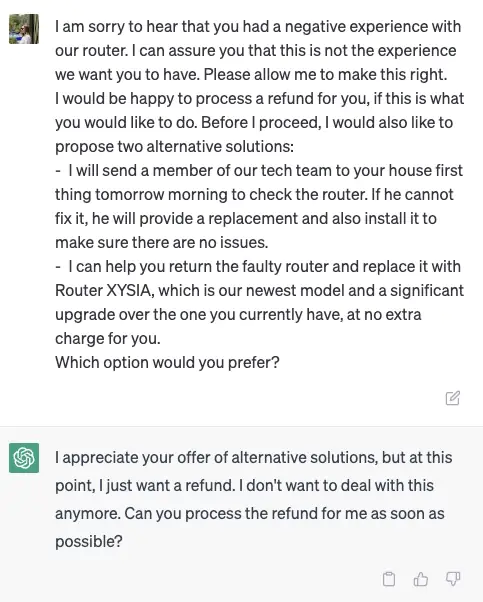
Good customer service is a critical differentiator that sets a business apart from its competitors. Customers are more digitally savvy than ever and expect quick and personalized responses to complaints. This makes organizations constantly seek ways how to improve customer service.
Businesses must constantly adapt and improve their customer service strategies to meet changing consumer demands and preferences. According to recent statistics:
With these numbers in mind, it’s clear that businesses that prioritize customer service are more likely to succeed in the long run. This means empowering customer service representatives, identifying the most effective channels, and choosing tools that add a personal touch.
This blog post will explore 12 customer service tips to stay ahead of the competition. From embracing artificial intelligence (AI) to nurturing good customer relationships, these tips will help you deliver an exceptional customer experience and keep your customers happy and loyal.
Why is great customer service important?
Brands that are well known for providing excellent customer service will develop a reputation that is hard to ignore.
When customers are in the consideration stage of their journey, the reputation of a business becomes a crucial factor that they take into account before making a decision. Effective customer support resolves issues, promptly addresses inquiries, and demonstrates the business’s commitment to customer satisfaction.
For 88% of customers, positive customer service experiences increase the likelihood of future purchases. Therefore, how you handle a customer interaction can determine whether or not the customer stays with your business.
Customers are the backbone of any business, and it’s key to make them feel important, heard, supported, and confident when interacting with your business. A great customer service experience can help retain customers and turn them into brand advocates more likely to recommend your business to others.
Providing outstanding customer service can result in many benefits for your organization.
- Better brand image: Positive customer service experiences encourage customers to leave positive reviews and share their experiences with others.
- A higher dollar amount spent per customer per transaction: Good customer service leads to increased customer numbers and encourages customers to spend more.
- Repeat customer visits: Customers are more likely to return to your business and make additional purchases when they feel valued and appreciated.
- More referrals to your business: Satisfied customers will likely refer their friends and family to your business.
The fundamentals of effective customer service
While the classic image of customer service involves an agent with a headset working at a call center to solve problems over the phone, the reality is that it takes place across various channels.
Customer service can mean responding to tweets or DMs and greeting customers as they enter a store. It’s about both resolving issues after a sale and providing information to potential customers considering your service.
Here are the main customer service principles you should consider:
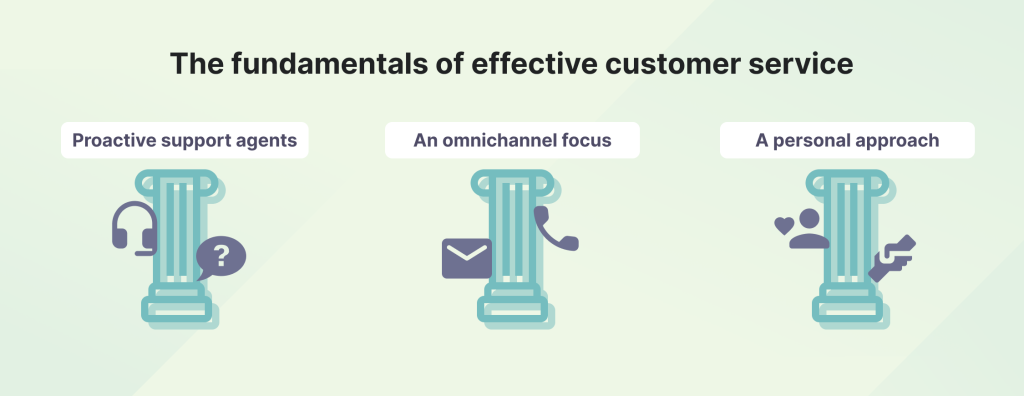
Proactive CSRs
When customer support representatives (CSRs) have the authority and resources to solve problems quickly and efficiently, customers are more likely to feel satisfied with the service they receive. Empowered CSRs also tend to be more engaged and motivated — one of the drivers of proactive customer service.
Omnichannel focus
Customers interact with businesses through various channels like email, social media, live chat, phone, and in-person. Customers expect to receive quick and efficient service, regardless of the channel they use. You can create consistent customer interactions by offering a seamless experience across all these channels.
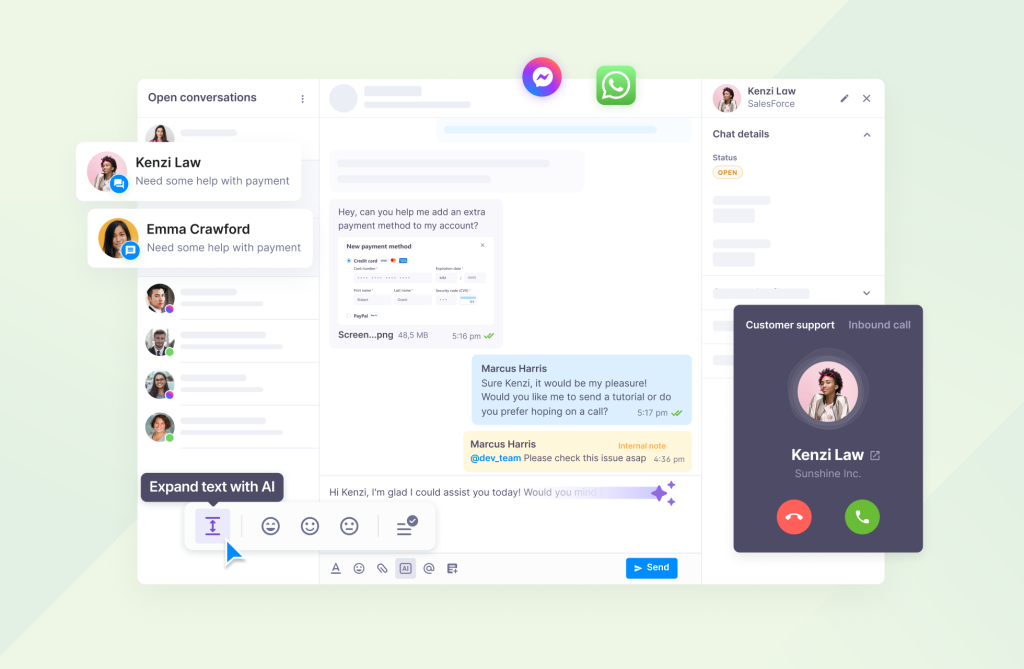
Personal approach
A personal approach to customer service means treating customers as individuals, not just numbers. This involves:
- Building customer relationships
- Understanding their needs and preferences
- Providing personalized solutions and recommendations
Aleksandra Lemzyakova, our head of customer support, shared her thoughts on the core principles of providing exceptional customer service:
How to improve customer service in 2025
A strong customer service team is essential for maintaining your online reputation, expanding your customer base, and keeping your current customers happy.
If you’re looking to improve your team’s capabilities, try implementing these actionable customer service tips.
1. Elevate the proficiency of your support team
Invest in strengthening your team’s customer service skills. Provide your team with access to the right tools and encourage a customer-centric culture.
Encourage your staff to work together and put the customer’s needs first. Teach them to treat each customer individually and actively listen to their comments, complaints, or requests.
- Assess your customer support agents’ current expertise level and identify areas for improvement.
- Conduct regular training sessions and workshops to stay up to date with the latest trends and customer service best practices.
- Provide online courses and certifications relevant to their job roles, such as conflict resolution, active listening, and problem-solving.
Here are some other skills that you may want to train your team for.
Empathy
When customer service agents show empathy, they acknowledge the customer’s feelings and validate their concerns. This creates a positive interaction, leading to a better resolution of the issue.
 You can improve empathy by training agents to understand different customer scenarios and how to react appropriately. Create an environment where they feel supported and valued, as this can help them approach customer interactions positively.
You can improve empathy by training agents to understand different customer scenarios and how to react appropriately. Create an environment where they feel supported and valued, as this can help them approach customer interactions positively.Knowledge
Provide ongoing training to keep agents up to date on product changes and updates. Encouraging them to ask questions and share knowledge with each other can also improve overall knowledge and service quality.
 Use interactive workshops or online resources to facilitate ongoing learning opportunities.
Use interactive workshops or online resources to facilitate ongoing learning opportunities.Level up support with Textmagic Point AI
Connect your knowledge base and trust it to deliver instant, accurate answers across all channels.

Work ethic
Customer support agents should have a strong work ethic and be able to manage their time effectively. This includes resolving issues promptly and efficiently and maintaining an appropriate resolution time.
You can improve their overall service quality by creating a culture that values hard work and dedication to customer service. Alari Aho, CEO at Toggl, told us how they do that:
Thick skin
Customer support agents need to handle negative feedback and emotionally charged situations without becoming defensive or taking it personally. By remaining calm, professional, and empathetic, agents can work towards resolving the issue and maintaining a positive relationship with the customer, even in difficult situations.
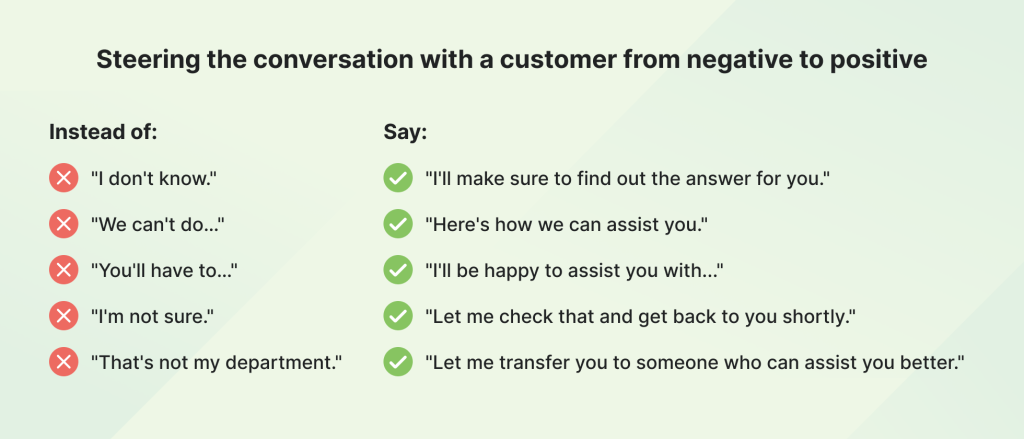
Gary Gray, co-founder at CouponChief, explains why it’s so important to strike the right balance between thick skin and empathy:
2. Monitor all touchpoints
As previously mentioned, customers interact with a business through multiple touchpoints. Therefore, monitoring all these touchpoints is crucial to ensuring a consistent and seamless customer experience.
Implement an analytics system that tracks key metrics and generates detailed reports. By capturing data on response times, customer success metrics, and resolution rates across channels, businesses can identify areas of improvement and allocate resources accordingly.
Leveraging performance monitoring tools designed for each touchpoint can provide deeper insights into customer interactions. For instance, you can utilize call monitoring and transcription services to evaluate the quality of phone conversations, identify training needs, and ensure consistent adherence to service standards.
 Chat logs and email tracking systems can help you assess response accuracy, identify bottlenecks, and refine communication protocols.
Chat logs and email tracking systems can help you assess response accuracy, identify bottlenecks, and refine communication protocols.3. Improve customer interactions
Personalized experiences lead to repeat purchases for 56% of customers.
The shift in customer expectations means businesses should go beyond generic interactions and embrace personalization as a key strategy. This entails:
- Understanding customer preferences
- Leveraging data-driven insights
- Implementing strategies that deliver customized solutions.
For business-to-business (B2B), personalization can involve tailoring your service to meet each customer’s needs. This can include offering customized pricing based on purchase volume, personalized training, or custom integrations.
Provide regular updates on product releases or offer educational resources to help your customers. By being proactive, you can build a strong and lasting relationship with them.
 To enhance customer interactions, ensure that communication is clear and easily understandable. Technical terms or jargon can confuse and frustrate customers, harming their experience. Plain language and straightforward explanations can help establish trust and confidence.
To enhance customer interactions, ensure that communication is clear and easily understandable. Technical terms or jargon can confuse and frustrate customers, harming their experience. Plain language and straightforward explanations can help establish trust and confidence.4. Enhance client service strategy
There are several ways to enhance your client service strategy for better customer support.
- Get personal: Provide a phone line for support so customers can get help quickly without waiting for an email response.
- Create communities to make customers feel appreciated: Use various platforms, such as social media, webinars, or interactive websites.
- Ensure your website is user-friendly: Customers appreciate when they can easily find the information they need.
- Respond quickly to any customer inquiries or complaints: This shows that you value their time and are committed to providing quality service.
Encourage open communication and feedback loops among team members to identify areas for enhancement. Actively listen to customer feedback and use it as a catalyst for positive change.
 Enhancing client service is an ongoing process. It requires continuous evaluation, improvement, and adaptation to evolving customer needs.
Enhancing client service is an ongoing process. It requires continuous evaluation, improvement, and adaptation to evolving customer needs.5. Ensure team engagement
To prevent dissatisfied and unengaged customer service representatives from keeping their problems to themselves, seek feedback from them. Find out how they feel about compensation, working conditions, and training. Engage employees by providing adequate training, incentives, and opportunities for career growth.
Engaged team members who feel valued and inspired are more likely to go the extra mile. Whether it’s team-building trips, social gatherings, or volunteering initiatives — these events create a sense of belonging and encourage collaboration among team members. An engaged workforce is more committed to delivering exceptional service.

6. Give customers ways to provide feedback
There are various methods to collect customer feedback, including:
- Surveys
- Social media polls
- Website feedback widgets
- Direct conversations
Actively seeking feedback and taking meaningful actions based on it can help you establish stronger relationships with your customers. You can strengthen these relationships by letting your customers know that their input is valued and used to enhance your offering.
When gathering feedback on customer service, ask targeted questions focusing on the service agent’s performance. For example, you could ask questions like the ones below to gain valuable insights into the strengths and weaknesses of your service team:
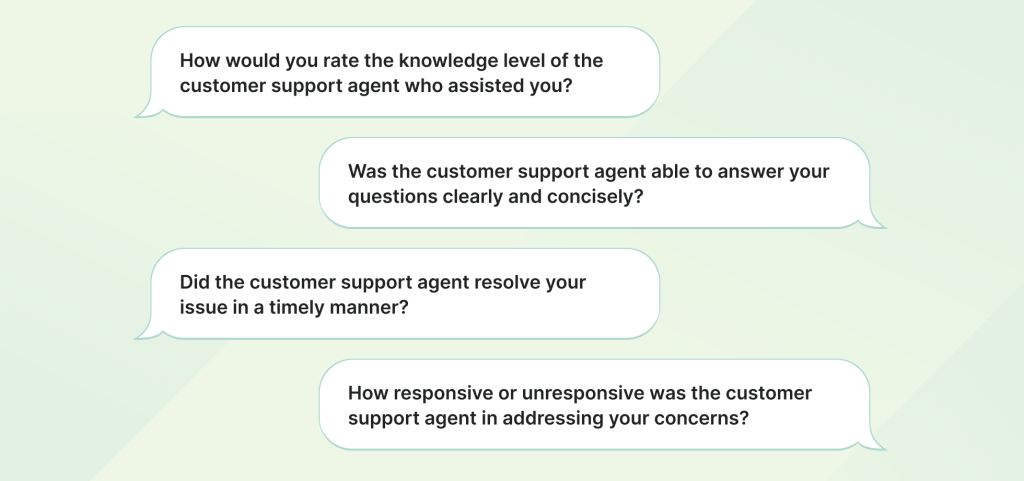
7. Enable automation to streamline manual processes
Use AI tools for customer support to automate repetitive or manual tasks. This can help to reduce wait times and improve efficiency, allowing customer service agents to focus on more complex issues.
One way to use automation is by implementing chatbots. These bots can handle basic customer inquiries and provide quick solutions without human intervention. This can easily free up customer service agents and improve response times.
In some cases, ChatGPT prompts can automate particular customer service interactions. For instance, you can create a ChatGPT prompt to answer questions about product specifications, refund policies, or shipping information.
With its capabilities for understanding natural language, ChatGPT can be trained to handle a wide range of customer inquiries and provide accurate and consistent responses. This allows customer agents to offload common inquiries to ChatGPT. That means more time to focus on more personalized customer interactions.
8. Enhance self-service options
Implement various strategies to empower customers to find solutions independently. Self-service options improve efficiency by reducing the need for direct customer support. They also empower customers to take control of their experiences.
- Expand your frequently asked questions pages to cover a wider range of common customer inquiries.
- Craft detailed troubleshooting guides and knowledge bases with step-by-step instructions.
- Create an online community forum where customers can ask questions and share experiences with fellow users.
- Utilize self-service portals where customers can manage subscriptions or memberships on their own.
 Consider implementing interactive tools like video tutorials to showcase product features visually. These can help customers resolve various issues or learn how to use your services properly.
Consider implementing interactive tools like video tutorials to showcase product features visually. These can help customers resolve various issues or learn how to use your services properly.9. Leverage video for a personal touch
Leveraging video for customer service creates a human connection, showing genuine care for your customers’ needs.
- Use video calls to engage in face-to-face customer interactions for a more personalized support experience.
- Send personalized video messages to address complex support issues or provide detailed instructions.
- Host live video question and answer (Q&A) sessions or webinars to interact with customers in real time.
- Implement video feedback surveys to gather insights into how to improve your team’s customer service skills.
10. Check out your competitors
Analyze your competitors’ online reviews on sites like Trustpilot, Capterra, GoodFirms, or G2. Pay attention to the recurring themes in both positive and negative reviews. This can help you understand what customers value most and where your competitors may fall short.
Take note of any unique selling points your competitors offer and consider incorporating them into your strategy. Analyze their strengths and weaknesses and take inspiration from their customer service skills.

11. Invest in cybersecurity and data privacy
Robust cybersecurity measures protect sensitive customer information from cyber threats and data breaches. A proactive approach builds trust and demonstrates a commitment to customer privacy.
Implementing encryption protocols and access controls ensures secure handling of customer data. Customers feel valued and respected when they know that their privacy and security are being prioritized.
Alex Freeburg, founder of Freeburg Law, shared some measures you can take to prevent sensitive customer data leaks:
12. Stay ahead with technology
Continuously exploring new tech advancements can revolutionize the customer experience.
- Virtual reality (VR) for product demonstrations can provide customers with immersive experiences, allowing them to visualize products in a more engaging way.
- Leveraging augmented reality (AR) can offer even more interactive experiences. These can include virtual try-ons for clothing or visualizing furniture in a customer’s space before purchase.
Customer service mistakes to avoid
There are certain mistakes that can undermine your efforts to improve customer service. They can lead to customer dissatisfaction, so make sure to avoid them at all costs:
- Failing to follow up: Not following up after a support interaction can leave customers feeling their issues are unresolved. Follow-ups show commitment to customer satisfaction and help in building long-term relationships.
- Over-promising and under-delivering: Setting unrealistic expectations can lead to disappointment and distrust. It’s crucial to be honest about what your service can deliver to avoid damaging customer trust.
- Failing to recognize loyal customers: Not acknowledging or rewarding your loyal customers can make them feel taken for granted. Recognizing and appreciating their loyalty can foster a stronger relationship.
Improve support and your clients will thank you
Investing in superior support leads to happier customers and contributes to your company’s bottom line. Satisfied clients are more likely to renew contracts, provide positive referrals, and explore additional services or upgrades.
From providing personalized interactions to embracing automation, there are numerous ways you can improve your customer service in 2025. With the proper tools and resources, these strategies can ensure a smooth and efficient implementation.
Related articles
15 Email survey templates to ensure customer feedback
Email surveys have emerged as a critical tool for bu...
From leads to deals: Navigating the 7 sales pipeline stages
Lost deals are a thing of the past. Learn how to opt...
7 Tested Ways to Use Texting for Your Small Business [Infographic]
Using digital tools for communication is now a stapl...
SMS opt-in and opt-out: A guide to effective messaging compliance
Having accessible SMS opt-in and SMS opt-out mechani...
10 Sectors making the most of text message marketing
Text messaging has become a popular, effective marke...
